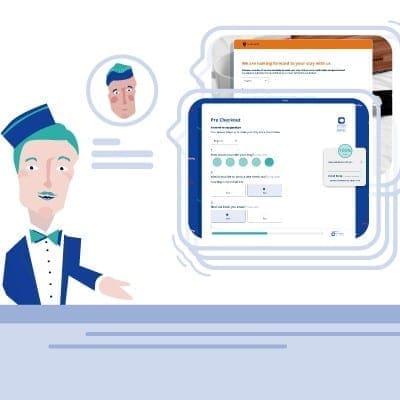 As a hotelier, it’s my job to ensure that guests have an excellent time from the moment they enter our doors or engage with staff. We often think about the front desk as the point of first impressions, but we can easily forget other guest service touchpoints, from airport shuttle service and guest parcel storage/retrieval to room service ordering and request fulfillment. As we all know, it is very hard to run a glitch-free operation. Even when we try to anticipate problems and put safeguards in place, something inevitably happens that turns a potentially perfect stay into a negative online review.
As a hotelier, it’s my job to ensure that guests have an excellent time from the moment they enter our doors or engage with staff. We often think about the front desk as the point of first impressions, but we can easily forget other guest service touchpoints, from airport shuttle service and guest parcel storage/retrieval to room service ordering and request fulfillment. As we all know, it is very hard to run a glitch-free operation. Even when we try to anticipate problems and put safeguards in place, something inevitably happens that turns a potentially perfect stay into a negative online review.
I believe that all hoteliers share the knowledge that no matter how smooth the operation runs, eventually something will fail. I will also venture to say that not all hoteliers think or understand that what matters most to the guest is not the flawlessness of the experience itself, but how a glitch is addressed and rectified. The sooner management can address the glitch, the better the chances of the hotel getting a positive review and avoiding a bad one altogether. One of the best ways to achieve great customer satisfaction is to connect with guests using the hotel’s web-based GuestApp while they are still onsite and before they can post online reviews.
Digital communication is key. If you wait until the guest has checked out to request feedback, it is probably too late to make amends in case anything went wrong. Assessing guest satisfaction on day one equips management with vital information, enabling them to turn a potentially negative situation into a positive online review.
Proactive guest messaging sets the tone for the rest of the stay. When problems are ignored by management, they usually end up as a nasty review where tens of thousands of travelers will surely read about them online. If you can capture feedback before guests leave, make amends, and then invite them to come back, they will oblige simply because you showed that you care.
If hoteliers wants to get excellent online ratings, they can no longer see guests as just heads in beds. Each traveler is to be valued — especially with today’s industry state. As stewards of hospitality, we owe it to those staying in our rooms to be treated as if they were staying in our homes.
Using the hotel’s Guest App for early two-way communication is key to building loyalty. Ask, “Is there anything you need?” “Can I make a recommendation for dinner?” “Would you like us to put your favorite bottle of wine in your room this evening?” Each interaction builds a more detailed guest history and enables hotel teams to provide even better hospitality.
Even after guests check out, conversations do not need to end. One or two days after departure, send guests a customized email asking them to rate their overall experience based on one to five stars, and if they would recommend the hotel to others. Gathering this information is essential for net promoter scores. Then, ask guests to tell you about their experience in their own words.
 Surveys drive human interaction
Surveys drive human interaction
If you want people to engage with you, take the first step and reach out to them. This is especially appreciated when guests use mobile keys to bypass the front desk at check-in. It is important to know someone is there, even if they don’t want to interact face to face. In this way, the hotel’s Guest App provides a human connection, even for the most socially distant traveler. When guests decide to go back to a city or place, they will always choose an accommodation where they feel valued. Leveraging the Guest App for two-way communication is an excellent service and engagement differentiator.
Ensuring that the hotel’s Guest App is task-based is key to engagement and better online reviews. For example, a guest will rarely want to randomly chat with front desk staff; they have other things to do. But, if they want or need something, that’s when conversations begin. Having a text-based, but task-oriented Guest App will enable travelers to reach out and order food, request the Wi-Fi password, ask for more towels or a forgotten amenity, etc. When the conversation resides within the Guest App, it creates a ticket system for staff and a paper trail for management to audit should questions arise in the future about how requests were managed.
A properly designed Guest App can be the Holy Grail of hospitality. It can serve as an extension of the hotel’s guest services team — almost like having a concierge in one’s pocket. With just a touch, guests have access to information and people when they need it. They can immediately rectify problems and gain peace of mind that a live person is standing by to meet their every need.
Guest Apps can also be leveraged to mitigate issues and prevent complaints from happening altogether. If a staff member sees an issue with equipment or furnishings, they can report the issue in full detail within the Guest App. This is a quick way to get issues in front of the right people before a guest can complain.
It’s amazing how empowered hotel employees feel when you give them the tools needed to do their jobs easier and more efficiently. At a time when loyalty and retention are vital to keeping doors open, making associates feel part of the team is critical. Leveraging the hotel Guest App to give employees a voice is an easy way to boost morale and heighten guest service.
About the author
 Thomas Zarikian served on the Board of Governors for the Miami Beach Chamber of Commerce and is CEO of EB Hotels, part of the Eurobuilding Hotels Group, a small hotel chain with luxury properties in the US and South America. In 2021, Zarikian unveiled GuestHub, a Guest Experience Quality Control Solution that focuses on increasing ADR and Occupancy by improving guest satisfaction. GuestHub enables the guest to submit different requests through their personal device easily and intuitively without downloading an app, classifying, routing, keeping track, and alerting the staff when needed. GuestHub can handle open guest requests, issues, amenities, food and beverages, courtesy shuttle requests and tracking, guest parcels, lost and found items, real-time guest satisfaction, and more. To learn more, visit https://guesthub.io.
Thomas Zarikian served on the Board of Governors for the Miami Beach Chamber of Commerce and is CEO of EB Hotels, part of the Eurobuilding Hotels Group, a small hotel chain with luxury properties in the US and South America. In 2021, Zarikian unveiled GuestHub, a Guest Experience Quality Control Solution that focuses on increasing ADR and Occupancy by improving guest satisfaction. GuestHub enables the guest to submit different requests through their personal device easily and intuitively without downloading an app, classifying, routing, keeping track, and alerting the staff when needed. GuestHub can handle open guest requests, issues, amenities, food and beverages, courtesy shuttle requests and tracking, guest parcels, lost and found items, real-time guest satisfaction, and more. To learn more, visit https://guesthub.io.


 Surveys drive human interaction
Surveys drive human interaction













